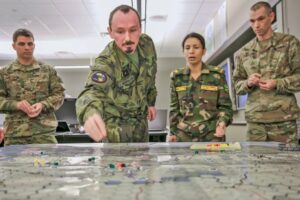Helmuth von Moltke the Elder would be a great name for an NPC in a Dungeons and Dragons adventure--perhaps a stodgy mercenary commander and explorer who is trying to outwit and outhustle the party in a race to acquire the secrets of a lost tomb.
More relevant to this article, Helmuth von Moltke the Elder was the chief of Staff of the Prussian Army who was famously quoted saying “No plan survives contact with the enemy.” This is certainly true for DMs planning D&D games. While we may anticipate aspects of how players react to certain situations, outcomes seldom go according to even the players’ plans, let alone the GM’s.
So why do we plan? And to what degree should we plan?
Planning to Hit the Right Notes at the Right Time
I focus my planning on the climax of each adventure. In fact, that’s usually why I’ve decided one of my ideas qualifies as a standalone adventure in the first place: I’ve discovered some confluence of mechanical challenges and story beats that comes together in a moment of exciting dramatic tension.
Next I ask myself, “How does my adventure sync up with my time constraints and hit the climax at the perfect time?” If I’m running a four-hour one-shot, how do I hit the climax at the 3.5 hour mark? If it’s a two-year campaign, how do I hit the climax at week 100, leaving a week or two for denouement?
Then I just fill in the details, like the key scenes, NPCs, and potential sources of conflict, and it’s a smooth short sail to the finish line.
Wait, Actually, I Plan Obsessively
Actually, I keep planning and then plan some more, exploring depths of planning I thought no DM was meant to explore. Writing scripts for NPCs I will never use on game day because I know they will sound stilted and break the game’s natural flow. Creating complex conditional flowcharts of how each NPC may react and then counter-react to specific decisions the PCs might take. I’m lucky to use them one time in ten. At one point I had an existential crisis, raised my arms to the heavens, and implored the gods as to why I’m destined to spend all this time on fruitless planning.
Then I realized I wasn’t planning, but wargaming.
Planning as Wargaming
 When military generals wargame, they are not predetermining exactly how a scenario must unfold, but rather building a strategic framework for advancing their position. They devise hypothetical situations and then game them out, hoping in the process to build the capacity of themselves and their troops to appropriately respond should a real war break out. Applying this concept to DM planning, we are not predetermining outcomes, but building our capacity to strategically interact with the players and achieve our objective.
When military generals wargame, they are not predetermining exactly how a scenario must unfold, but rather building a strategic framework for advancing their position. They devise hypothetical situations and then game them out, hoping in the process to build the capacity of themselves and their troops to appropriately respond should a real war break out. Applying this concept to DM planning, we are not predetermining outcomes, but building our capacity to strategically interact with the players and achieve our objective.
I can hear you now. “Doesn’t this guy know the age of the killer, antagonistic GM is past? Why are you wargaming your players?”
I’m not wargaming to defeat them. I am wargaming the climax.
Wargaming the Climax
We wargame the climax to build our capacity on gameday to judge, immediately and after the players have decided on any course of action, how to realign the trajectory of the game towards its best possible climax.
I always plan what I expect to be an exciting climax, but when the players go off the rails, they often organically point the game in an even better direction. The climax is not determined solely by the choices of the players, however. Dramatic tension necessarily involves another party whose interests stand in conflict with those of the players, and the climax is the moment of highest dramatic tension between those conflicting interests.
Thus wargaming the climax becomes a deep study of our antagonists and how they may react to the choices of the players. We come to know our antagonists inside out, building our capacity to adjust on-the-fly but still maintain plot continuity and consistency of character.
Conceiving of planning as wargaming makes clear that exploring hypothetical scenarios is actually a productive use of our time. When we deeply understand the motivations of our antagonists and how they react to the PCs, we can confidently hit the right story beats and execute a climactic final scene filled with dramatic tension. As Helmuth von Moltke the Elder wrote so many years ago** “This is how you get your players off the railroad but keep them on the train.”
**Disclaimer: Helmuth von Moltke the Elder said nothing of the sort. But this sounded like the perfect concluding phrase you’d hear in a self-help book, the kind where it sounds good the first time you hear it, but then you think more deeply about it and you’re like wtf does that actually mean. The phrase was so bad, I had to use it.